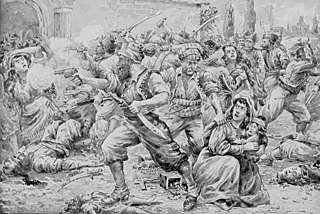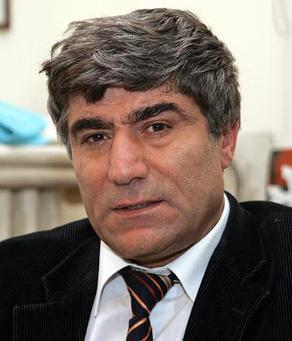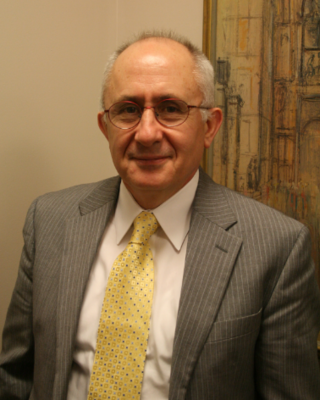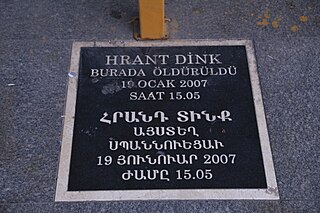Contents
- Incumbents
- Events
- January
- February
- March
- April
- May
- June
- July
- August
- September
- October
- November
- December
- Deaths
- References
| |||||
| Decades: | |||||
|---|---|---|---|---|---|
| See also: | Other events of 2007 List of years in Armenia | ||||
Events from the year 2007 in Armenia
| |||||
| Decades: | |||||
|---|---|---|---|---|---|
| See also: | Other events of 2007 List of years in Armenia | ||||
Events from the year 2007 in Armenia

Andranik Nahapeti Margaryan was an Armenian politician who served as the Prime Minister of Armenia from 12 May 2000, when the President appointed him, until his death on 25 March 2007. He was a member of the Republican Party of Armenia. He succeeded the Sargsyan brothers: Vazgen Sargsyan, who was murdered during the Armenian parliament shooting on 27 October 1999 and Aram Sargsyan, whom the President appointed a week later, but fired on 2 May 2000.
Article 301 is a lèse-majesté law of the Turkish Penal Code making it illegal to insult Turkey, the Turkish nation, Turkish government institutions, or Turkish national heroes such as Mustafa Kemal Atatürk. It took effect on June 1, 2005, and was introduced as part of a package of penal law reform in the process preceding the opening of negotiations for Turkish membership of the European Union (EU). The original version of the article made it a crime to "insult Turkishness"; on April 30, 2008, the article was amended to change "Turkishness" into "the Turkish nation". Since this article became law, charges have been brought in more than 60 cases, some of which are high-profile.
Armenians in Turkey, one of the indigenous peoples of Turkey, have an estimated population of 40,000 to 50,000 today, down from a population of over 2 million Armenians between the years 1914 and 1921. Today, the overwhelming majority of Turkish Armenians are concentrated in Istanbul. They support their own newspapers, churches and schools, and the majority belong to the Armenian Apostolic faith and a minority of Armenians in Turkey belong to the Armenian Catholic Church or to the Armenian Evangelical Church. They are not considered part of the Armenian Diaspora, since they have been living in their historical homeland for more than four thousand years.

Anti-Armenian sentiment, also known as anti-Armenianism and Armenophobia, is a diverse spectrum of negative feelings, dislikes, fears, aversion, racism, derision and/or prejudice towards Armenians, Armenia, and Armenian culture.

Diplomatic relations between Armenia and Turkey are officially non-existent and have historically been hostile. Whilst Turkey recognised Armenia shortly after the latter proclaimed independence in September 1991, the two countries have failed to establish diplomatic relations. In 1993, Turkey reacted to the war in Nagorno-Karabakh by closing its border with Armenia out of support for Azerbaijan.

Hrant Dink was a Turkish-Armenian intellectual, editor-in-chief of Agos, journalist, and columnist. As editor-in-chief of the bilingual Turkish-Armenian newspaper Agos, Dink was a prominent member of the Armenian minority in Turkey best known for advocating Turkish–Armenian reconciliation and human and minority rights in Turkey. He was often critical of both Turkey's denial of the Armenian genocide and of the Armenian diaspora's campaign for its international recognition. Dink was prosecuted three times for denigrating Turkishness, while receiving numerous death threats from Turkish nationalists.
Arat Dink is a Turkish journalist and the executive editor of Agos, a bilingual Turkish-Armenian weekly newspaper published in Istanbul. He is the son of Rakel Dink and Hrant Dink, the former editor-in-chief of the same paper, who was murdered by Ogün Samast, a Turkish ultra-nationalist who was seventeen years old at the time.

Armenian genocide recognition is the formal acceptance of the fact that the Ottoman Empire's systematic massacres and forced deportation of Armenians from 1915 to 1923, both during and after the First World War, constituted genocide.

Altuğ Taner Akçam is a Turkish-German historian and sociologist. During the 1990s, he was the first Turkish scholar to acknowledge the Armenian genocide, and has written several books on the genocide, such as A Shameful Act (1999), From Empire to Republic: Turkish Nationalism and the Armenian Genocide (2004), The Young Turks' Crime Against Humanity (2012), and Killing Orders (2018). He is recognized as a "leading international authority" on the subject. Akçam's frequent participation in public debates on the legacy of the genocide have been compared to Theodor Adorno's role in postwar Germany.

The prominent Turkish-Armenian journalist Hrant Dink was assassinated in Istanbul on 19 January 2007. Dink was a newspaper editor who had written and spoken about the Armenian genocide and was well known for his efforts for reconciliation between Turks and Armenians and his advocacy of human and minority rights in Turkey. At the time of his death, he was on trial for violating Article 301 of the Turkish Penal Code and "denigrating Turkishness". His murder sparked both massive national protests in Turkey itself as well as widespread international outrage.
Aram Margaryan is a retired Armenian Freestyle wrestler. He is a World Champion, winning the gold medal in 2002. Margaryan was awarded the Honored Master of Sports of Armenia title in 2009.

The confiscation of Armenian properties by the Ottoman and Turkish governments involved seizure of the assets, properties and land of the country's Armenian community. Starting with the Hamidian massacres and peaking during the Armenian genocide, the confiscation of the Armenian property lasted continuously until 1974. Much of the confiscations during the Armenian genocide were made after the Armenians were deported into the Syrian Desert with the government declaring their goods and assets left behind as "abandoned". Virtually all properties owned by Armenians living in their ancestral homeland in Western Armenia were confiscated and later distributed among the local Muslim population.
The following lists events that happened in 2006 in Armenia.

Amberin Zaman is a Turkish journalist and a chief correspondent for Al-Monitor based in London covers major stories on the MENA. Having started as a journalist in the early 1990s in Turkey, Zaman contributes to various newspapers throughout the world. Her reporting focuses on geopolitical trends, conflicts, diplomacy and human rights. She studied political science at Franklin College in Lugano Switzerland, speaks fluent English, French, Turkish and Bengali.
Tuba Çandar is a Turkish journalist and author of biographies of three leading Turkish intellectuals. Her 700-page biography of the murdered Armenian journalist Hrant Dink's life "Hrant" (2010) is a best-seller in Turkey for which she interviewed 125 people.
Anti-Armenian sentiment or Armenophobia in Turkey has a long history dating back to the Ottoman Empire, something that eventually culminated in the Armenian genocide. Today, anti-Armenian sentiment is widespread in Turkish society. In a 2011 survey in Turkey, 73.9% of respondents admitted having unfavorable views toward Armenians. According to Minority Rights Group, while the government recognizes Armenians as a minority group, as used in Turkey this term denotes second-class status. The word "Armenian" is widely used as an insult in Turkey by both civilians and by politicians.

Garo Paylan is a politician from Turkey and one of the country's leading democracy activists. Paylan was among the few Armenians elected to the Grand National Assembly of Turkey and served for two consecutive terms in 2015–2018 and 2018–2023, representing Istanbul and Diyarbakir. He is a founding member of the Peoples' Democratic Party (HDP) and since 2016 was the first Armenian in the history of the Republic of Turkey to publicly discuss the Armenian genocide of 1915 from the podium of the Turkish parliament. Paylan is recognized for his activism on human rights and minority rights in Turkey and has been the recipient of several awards, including the Grand Vermeil Medal and has been twice nominated for the Nobel peace prize.
Rakel Dink is a Turkish Armenian human rights activist, and head of the Hrant Dink Foundation.
Hrant Dink Foundation is an organization established following the 2007 assassination of Hrant Dink, a prominent Turkish-Armenian journalist, in order to "carry on Hrant’s dreams, Hrant’s struggle, Hrant’s language and Hrant’s heart". Among the organization's specific goals are to monitor hate speech in Turkey, to study history from a non-nationalist perspective especially using oral history, build relationships between Turkey, Armenia and Europe, and improve democratization and human rights in Turkey.